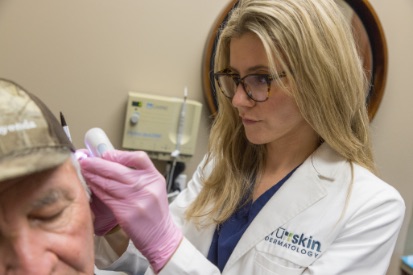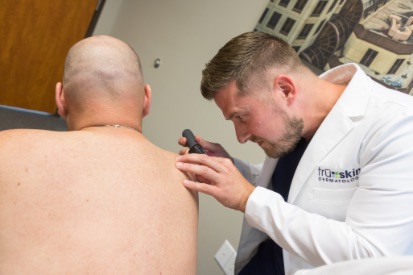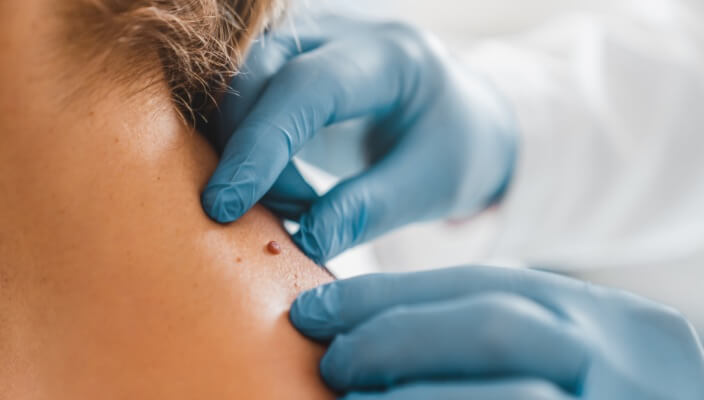Merkel Cell Carcinoma
Premium Merkel Cell Carcinoma Treatments in Austin, TX
 Understanding and addressing Merkel Cell Carcinoma in Central Texas requires expert care, and Tru-Skin Dermatology delivers just that across our seven locations, including Austin, Bastrop, La Grange, Spring Branch, Cedar Park, Hallettsville, and Round Rock. Merkel Cell Carcinoma is a rare but serious form of skin cancer requiring specialized treatment. At our clinics, we provide advanced options designed to effectively treat and manage this condition. Our expert dermatologists, supported by innovative technology and a commitment to skin health, are equipped to guide you through the best treatment paths. Prioritizing your health, we empower you with knowledge and effective treatment strategies.
Understanding and addressing Merkel Cell Carcinoma in Central Texas requires expert care, and Tru-Skin Dermatology delivers just that across our seven locations, including Austin, Bastrop, La Grange, Spring Branch, Cedar Park, Hallettsville, and Round Rock. Merkel Cell Carcinoma is a rare but serious form of skin cancer requiring specialized treatment. At our clinics, we provide advanced options designed to effectively treat and manage this condition. Our expert dermatologists, supported by innovative technology and a commitment to skin health, are equipped to guide you through the best treatment paths. Prioritizing your health, we empower you with knowledge and effective treatment strategies.
What is Merkel Cell Carcinoma?
Merkel Cell Carcinoma (MCC) is a rare and aggressive form of skin cancer known for its tendency to return and spread quickly. It affects around 3,000 new patients annually in the United States, with a significant recurrence rate of approximately 40 percent. Despite its daunting nature, advancements in treatment, such as immunotherapy, are proving effective in managing recurrent cases. These therapies harness the body’s immune system to target and combat the cancer cells, offering hope to many affected individuals. Being aware of MCC’s aggressive behavior ensures early detection and proactive management, which is crucial for improving outcomes for those affected.
What Does Merkel Cell Carcinoma Look Like?
A fast-growing, painless nodule on the skin is often the first sign of this type of cancer. These nodules may vary in color, appearing as skin-colored or in hues such as red, blue, or purple. Although they can emerge on any body part, they most commonly occur on the face, head, or neck. It’s important to note that these growths can also develop in areas that have not been exposed to sunlight. Their rapid enlargement and the diversity in appearance highlight the need for professional evaluation and possible intervention. Early detection and treatment remain crucial in managing this aggressive skin cancer.
What Causes Merkel Cell Carcinoma?
There are several known causes of Merkel Cell Carcinoma that contribute to its development. While exposure to ultraviolet (UV) rays from the sun or tanning beds is a significant factor, it is not the only one. UV radiation can alter the DNA in skin cells, leading to cancerous growths. Additionally, a large percentage of Merkel Cell Carcinoma cases are associated with the Merkel Cell Polyomavirus (MCP). Although many people carry this virus without symptoms, it only leads to cancer in a few. Understanding these elements and others can aid in prevention and early detection. Below are additional factors that may lead to this condition:
Ultraviolet Exposure
Merkel Cell Polyomavirus (MCP)
Weakened Immune System
What Are Some Merkel Cell Carcinoma Symptoms?
Merkel Cell Carcinoma symptoms often manifest as noticeable changes to the skin, such as lumps or tumors. These tumors usually form on skin with significant sun exposure, such as the face, neck, arms, or eyelids. In individuals with darker skin, the carcinoma may appear on the legs, while younger patients might notice them on their torso. Often, these growths manifest as shiny or pearly lumps, resembling common skin conditions like pimples or insect bites. Early detection is vital, so it’s important to observe any unusual changes in your skin’s appearance or feel. Below, we have outlined key symptoms of Merkel Cell Carcinoma:
Rapid Growth—These lumps are often small, approximately the size of a dime, but can grow quickly. Swift changes in size are a hallmark sign, indicating that you should seek a medical evaluation immediately.
Firm Texture – The lumps are usually dome-shaped and raised, with a firm feel. They might be mistaken for more benign conditions, which makes professional diagnosis critical.
Color Variations—These tumors can be skin-colored or exhibit shades of red, purple, or bluish-red, making visual identification challenging without proper medical assistance.
Irregular Sensations – The affected area may be itchy, tender, or sore. Persistent discomfort should always be reported to a healthcare provider for further examination.
Common Locations—Typically located in sun-exposed areas, lumps in typical areas like the face or less common zones, such as the eyelids or torso, should be given attention, especially if they persist or change rapidly.
How Do You Prevent Merkel Cell Carcinoma?
Preventing Merkel Cell Carcinoma involves being vigilant about your skin and taking proactive measures to minimize potential risks. Making some lifestyle changes can play a crucial role in risk reduction. Additionally, implementing a few protective habits from UV rays can help shield your skin. Let’s take a look at some ways to help you reduce your risk of developing this skin condition:
Avoid Peak Sun Exposure—Stay indoors or in shaded areas during peak sunlight, typically between 10 a.m. and 4 p.m. If outdoor activities are unavoidable, try to schedule them for earlier in the morning or later in the afternoon when the sun isn’t as intense.
Use Protective Clothing—Wear a wide-brimmed hat and tightly woven clothing to shield your skin from UV rays. Sunglasses blocking ultraviolet light can also protect your eyes from harmful sun exposure.
Apply Sunscreen Correctly – Choose a broad-spectrum sunscreen with an SPF of at least 30. Apply it generously and frequently, especially after swimming or sweating. Remember to cover all exposed skin, even on cloudy days.
Monitor Skin Changes—Observe and track any alterations in moles, freckles, or bumps on your skin. Report any noticeable changes in size, shape, or color to a healthcare professional promptly to increase the chances of successful treatment if necessary.
Explore Our Merkel Cell Carcinoma Treatments
If you are experiencing signs of Merkel Cell Carcinoma (such as rapidly growing, painless nodules on your skin), it’s pivotal to seek expert evaluation at one of our accessible clinics across Central Texas. Our dedicated team will perform a thorough skin examination to assess the presence of this rare and aggressive form of skin cancer. Should Merkel Cell Carcinoma be diagnosed, we are equipped with state-of-the-art treatments to target and manage your condition. Rest assured, a personalized treatment plan will be developed to address your specific needs and the progression stage of the carcinoma. Here is a look at the Merkel Cell Carcinoma treatments we offer:
Individualized Treatment Planning – After confirming a diagnosis, we develop a customized treatment plan tailored to your specific case. This plan considers the tumor’s size, location, and stage, ensuring you receive the most appropriate care.
Surgical Interventions—Surgical removal is frequently utilized in treating Merkel Cell Carcinoma. Our skilled surgeons focus on removing the tumor with precision, aiming to achieve clear margins while preserving as much healthy tissue as possible.
Radiation Therapy – Radiation therapy is an effective method for controlling tumors, especially if surgery is not feasible or if the carcinoma poses a high recurrence risk. It targets and destroys cancer cells, reducing the likelihood of spread.
Innovative Immunotherapy Options—For advanced cases, we offer cutting-edge immunotherapy treatments that enhance the body’s natural defenses to combat cancer more effectively. These treatments are continuously evaluated to ensure they align with the latest research and advancements in care.
On-Going Monitoring and Support – Regular follow-ups are crucial to monitor your recovery and check for potential recurrences. Our team provides comprehensive support throughout your treatment journey, offering expert advice and emotional reassurance.

Trusted for Skin Cancer Diagnosis & Treatment
Your skin’s health is paramount, and Tru-Skin Dermatology is here to help you. We invite you to schedule a consultation and discover the Merkel Cell Carcinoma treatments we offer. Whether you’re in Round Rock or La Grange, our experts are ready to assist you in exploring the best treatment options for your needs. Join our community of satisfied patients who have seen real, lasting results. Call us today at one of our many convenient locations to begin your path to healthier skin. Your wellness is our mission, and we look forward to partnering with you on this important journey.
Featured Sunscreens

EltaMD UV Clear SPF 46 original
Oil-free EltaMD UV Clear helps calm and protect sensitive skin types prone to discoloration and breakouts associated to acne and rosacea. It contains niacinamide (vitamin B3), hyaluronic acid and lactic acid, ingredients that promote the appearance of healthy-looking skin. Very lightweight and silky, it may be worn with makeup or alone. Choose from tinted and untinted formulas for use every day. 1.7 oz / 48 g

EltaMD UV Lip Balm SPF 36
This creamy, long-lasting moisturizing sunscreen soothes and protects dry, chapped and sun-exposed lips. EltaMD UV Lip Balm contains 5% Hydromanil™ for immediate and long-term moisturization. Powerful UV protection and a super hydrating power make UV Lip Balm the ideal protector for all skin types and lifestyles.
Related Blogs

- Skin Cancer
- Skin Exams
Skin cancer remains a critical public health issue across the globe, and Texas, with its vast landscapes and relentless sunshine, is no exception.
Read More
- Skin Cancer
- Skin Exams
- Sun Safety
Discover the importance of full body skin cancer screenings, especially for Texans with high sun exposure. Learn what to expect during your screening at Tru-Skin Dermatology in Austin, TX, and take control of your skin health.
Read More
- Skin Cancer
- Skin Exams
- Sun Safety
Ensure early detection of skin cancer. Learn seven top factors that could increase your need to get a total body skin exam and skin cancer screening.
Read More


